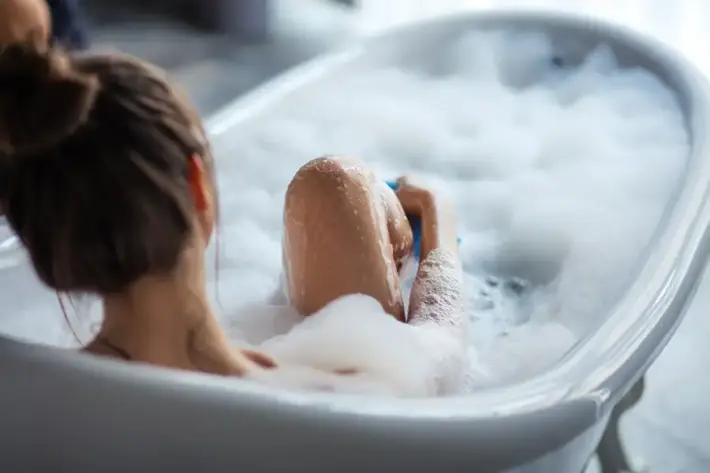How To Wash Your Vagina(Step by Step)

How To Wash Your Vagina: To keep it clean and healthy, your vagina needs to be properly cared for since it is a delicate area of the body. Your cervix’s internal entrance, known as the vagina, is self-cleaning and does not require washing. But in order to help avoid infections and discomfort in the vagina, it’s crucial to wash your vulva (the outside part of your genitals) and the region around your anus. To keep the area around your vagina clean, establish a daily washing routine. Additionally, you may maintain cleanliness by establishing appropriate hygiene practices, such as wearing breathable cotton underwear and wiping from front to back after using the restroom. Enough Info

Establishing a Daily Cleansing Schedule
At the very least once every day, wash the area surrounding your vagina
Sweat and moisture that accumulate in your genital region throughout the day might create a favorable environment for germs and yeast. To avoid vaginal infections and bad odors, wash the area every day as part of your regular bath or shower regimen. Enough Info
- During your menstrual cycle, it’s a good idea to wash more than once a day if you’re on your period.
Read Also: How To Deal With Anxiety(2023)
To clean your genital area, use basic, unscented soap
Use warm water and mild, unscented soap, feminine wash, or body wash to wash. Harsh, fragrant soaps can irritate your vulva and vagina and alter the pH balance of your vagina, perhaps causing infections.
- Some folks have no issues using mildly scented soaps. However, try switching to an unscented or hypoallergenic soap if you are prone to infections and irritability.
- You can wash your vulva with your hands or a very soft washcloth; however, never use a loofah or a hard washcloth. The region may get irritated if you scrub it. How To Become A Neurosurgeon(Tips)
Clean the folds surrounding your clitoris and spread your outer labia
Be sure to wash in between all the folds and creases surrounding your vagina.
- Spread your outer labia (the big, fleshy pads or “lips” on the outside of your vulva) gently, then gently clean the skin folds within. Be sure to wash the area surrounding your clitoris and the region outside the opening of your vagina as well.
- Avoid getting soap within your vagina because it can be unpleasant and dry.
Last, clean your anal region
Wash your vulva first, then the perineum (the region between your vagina and anus), your anus, and the region between your buttocks. When washing, always wash from front to back to avoid transferring germs from your anal area to your vagina. How To Deal With Puberty(2023)
- You run a higher chance of getting a vaginal or urinary tract infection if you wash from back to front. How To Waterproof A Wound For Swimming
Read Also: How To Know If You’re Depressed :
After rinsing, dry the area with a fresh towel
After bathing and cleaning yourself, pat your genital region dry with a clean, dry towel. Avoid rubbing the area because doing so may irritate it.
- Additionally, you can use a blow dryer on a low, cool setting to gently dry your vulva and groin region. 22 Top Foods For Promoting Heart Health(All You Need to Know)
Avoid using deodorant sprays, perfumed wipes, and douches
Numerous items on the market make the claim to encourage proper vaginal hygiene and keep you smelling good. These solutions, however, have the potential to irritate the skin and remove beneficial bacteria, which could result in infections. Never put anything scented on your vulva or vagina, and only use a douche if your doctor advises it.
- The use of bubble baths or scented bath oils should be avoided because they may irritate the vaginal area or lead to an infection. How To Stop Being Jealous( Requirements 2023 )
Maintaining proper vaginal hygiene
When you return from the bathroom, wipe from front to back
Every time you use the bathroom, wipe the toilet gently from front to back, even if you merely urinated. You run the risk of getting a vaginal or urinary tract infection if you wipe from back to front since doing so might spread bacteria from your anal area into your vagina or urethra.
- Avoid using toilet paper with fragrances, colors, or lotions since they can irritate your vagina and vulva. Be sure to only use white paper. 30 Ways To Make Money Online And Offline
Mineral oil should be used to clean up after difficult bowel motions
Doctors advise against wiping yourself off with wet wipes, even unscented ones. Add some mineral oil or unscented soap (like Dove or Cetaphil body wash) to your toilet paper to make wiping easier if you struggle to feel clean and fresh after a bowel movement. When you’re through, rinse off with some water and pat yourself dry.
- According to studies, using feminine wipes increases your risk of developing a urinary tract infection considerably in addition to causing pain and irritation. How To Be A Fashion Designer(Steps and Tips)
Read Also: How To Become A Neurosurgeon(Tips)
To lessen excessive odor and discharge, try soaking in baking soda
Most vaginal fluids and mild scents are normal and healthy. If they irritate you, though, you can clean your vulva and reduce odors by soaking it in baking soda. Lucent water should be half-filled in a bathtub before adding 4-5 tablespoons (58-72 g) of baking soda. Spend 10 minutes at a time in the tub 1–3 times a day. 30 Hobbies That Make You Money
- If you have inflammation or an infection, a baking soda soak can also help lessen burning and itching. How To Get Paint Off Vinyl Floors(The Ultimate Guide)
To avoid rubbing and drying out, wear cotton underwear
In the vicinity of your genital area, synthetic materials like nylon and polyester trap heat and moisture, fostering the growth of yeast and dangerous bacteria. Choose cotton underwear that is more breathable to avoid this, and switch to a new pair every day (or more often, if your underwear gets damp or sweaty).
- Thongs and tight-fitting clothing should be avoided as they might irritate your vulva by trapping heat and moisture.
- Try sleeping sans underwear or at night while wearing boxers made of loose cotton.
Before wearing new underwear, wash it
The vulva and vagina might become irritated by the harsh dyes or chemical residues in new undergarments. Before wearing underwear for the first time, always wash it. How To Put A Baby To Sleep
- Make sure to use a gentle, unscented detergent when washing your underwear. To ensure that all of the detergents are washed away, you can also run an additional rinse cycle.
Read Also: How To Make Your Hair Soft
Immediately change out of your damp clothes after a swim or workout
After swimming or working out, immediately change out of your wet clothes and properly dry yourself off. Continuing to wear wet or perspiring-filled garments might encourage the development of dangerous bacteria and yeast in and around your vagina.
- Shower as quickly as you can after working out or swimming to get rid of any sweat, dirt, or chlorine. How to Build a Sustainable and Healthy Diet Plan (2023)
During your period, replace your pads and tampons frequently
Replace your tampons or pads frequently if you get periods. To avoid the possibly fatal toxic shock syndrome, never wear a tampon for more than 8 hours. Attempt to replace your pads at least every 3 to 4 hours, even if you are not bleeding heavily.
- Use only items made of 100% cotton wherever possible, and avoid using perfumed pads or tampons. https://enoughinfo.com/how-to-wash-your…ginastep-by-step
To avoid infections, use condoms or other forms of protection during intercourse and urinate right away
By taking precautions each time you engage in sexual activity, you can lower your risk of contracting an STI (sexually transmitted illness) or a bacterial infection. Use an internal condom to protect your vagina, or request that your partner use protection.
- Urinating and taking a shower right away after having sex is also a good suggestion.
- By doing so, you may be able to wash away bacteria, perspiration, and other bodily fluids that could cause a bacterial infection or yeast infection. How To Avoid Miscommunication
Read Also: How To Deal With Period
FAQ & Answers
1, How often should I wash my vagina?
It depends on your own body’s needs and preferences, but the general recommendation is to wash your vagina and vulva two to three times per day with mild soap and warm water.
2, Is it safe to use douches or feminine washes around my vagina?
No, it is not recommended that you use douches or other feminine washes because they can disrupt the healthy vaginal environment and even cause infections. If you feel that you need some extra cleaning, it is best to just stick with warm water and mild soap.
3, Is it okay to use scented products on my vagina?
No, it is not recommended to use scented soaps or products on your vagina as they can irritate your delicate skin and disrupt the natural balance of your vaginal microbiome.




